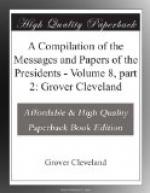I have heretofore proposed to the consideration of Congress the expediency of establishing a national university and also a military academy. The desirableness of both these institutions has so constantly increased with every new view I have taken of the subject that I can not omit the opportunity of once for all recalling your attention to them.
The assembly to which I address myself is too enlightened not to be fully sensible how much a flourishing state of the arts and sciences contributes to national prosperity and reputation.
True it is that our country, much to its honor, contains many seminaries of learning highly respectable and useful; but the funds upon which they rest are too narrow to command the ablest professors in the different departments of liberal knowledge for the institution contemplated, though they would be excellent auxiliaries.
Amongst the motives to such an institution, the assimilation of the principles, opinions, and manners of our countrymen by the common education of a portion of our youth from every quarter well deserves attention. The more homogeneous our citizens can be made in these particulars the greater will be our prospect of permanent union; and a primary object of such a national institution should be the education of our youth in the science of government. In a republic what species of knowledge can be equally important and what duty more pressing on its legislature than to patronize a plan for communicating it to those who are to be the future guardians of the liberties of the country?
The institution of a military academy is also recommended by cogent reasons. However pacific the general policy of a nation may be, it ought never to be without an adequate stock of military knowledge for emergencies. The first would impair the energy of its character, and both would hazard its safety or expose it to greater evils when war could not be avoided; besides that, war might often not depend upon its own choice. In proportion as the observance of pacific maxims might exempt a nation from the necessity of practicing the rules of the military art ought to be its care in preserving and transmitting, by proper establishments, the knowledge of that art. Whatever argument may be drawn from particular examples superficially viewed, a thorough examination of the subject will




